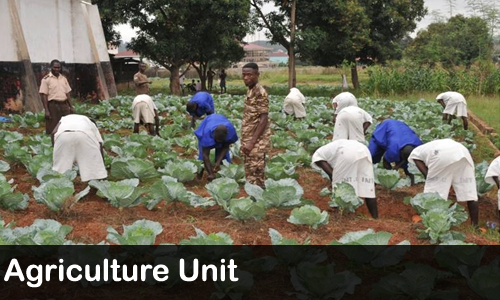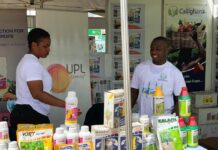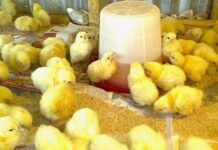Agriculture production in Ghana continues to be a sustainable source of economic growth. With the enormous prospects of the Ghanaian
agricultural sector, the Government of Ghana continues to initiate agricultural policy programmes to revive the sector to help in
reducing the menace of unemployment among the youth and non-working age groups in the country. There are many opportunities existing
in the agricultural value chain that is yet to be fully explored.
“The real task of making agriculture the pathfinder of ours nation’s development starts with us, and it must begin with an important
shift in attitude and mentality” – Dr. Owusu Afriyie Akoto, the Minister-Food and Agriculture. It behooves on us all as citizens to
put our hands on deck. Agriculture is our national keystone, it is the reason we have the colour green in our national flag. Our
agriculture tomorrow depends on our action today.
The key role played by the agricultural sector for the advancement of the Ghana’s economic independence cannot be over emphasized. To achieve a successful and sustainable agricultural production system in Ghana there is the need for the government and all other stakeholders to help by resourcing and building the capacity of some key institutions in the country. One such key institution that can contribute significantly to the advancement of the sector is the Ghana Prisons Service.
The Ghana Prisons Service, as a public institution mandated with the responsibility to ensuring the safe custody, reformation and the rehabilitation of offenders found guilty by the Laws of the country, has the potentials to harness this opportunity. Commercialization of agriculture in the Prisons Service will help ensure food sustainability in the service and help reduce the chunk of burden on the government in feeding inmates and boost the productivity of the Service.
Requisite
There is the need for the support in the areas of production, logistics and supply chain, manufacturing or processing, training and skill development and many more that can be done to help the service generate a sustainable income to supplement the government in their operations. Currently, the service undertake agricultural activities in the cultivation of maize, rice, cowpea, groundnuts, vegetables, yam, cassava, oil palm, coconut, acacia and teak production and animal husbandry in poultry, piggery and sheep production in most of their agricultural open camps across the country. However, all these productions are in small scale hence the need for support. The service has the potentials to expand and grow it agricultural operations when the needed support is provided by all stakeholders in the country in the following areas.
Production
The location of the Prison centres in the country is strategic and the agricultural settlement camps have all the resources and the potential to harness the agriculture benefits within their jurisdictions. Some of these centres undertake crops and animals production on a small-scale as a result of operational constraints such as low level of mechanization, lack of irrigation facilities, lack of storage facilities, lack of veterinary service and many other pertinent factors dwindling the production potentials of the service. Equipping the service in the agriculture production is a step towards the self-sufficiency in food production and income up-shot of the service and provision of jobs for inmates after their discharge from the prisons. With the numerous benefit that can be generated from the service agricultural sector. The Service can engaged in commercial production of maize, rice, sorghum, millet, sesame, soybean, vegetables (both local and exotic varieties) under irrigation or in greenhouses, plantain and banana, oil palm, coconut, shea-butter tree and cashew plantations, orange and mango orchards, passion fruits, pawpaw, sour-sop, cocoa, coffee, groundnut, cowpea, poultry, goat and sheep production, piggery, rabbit rearing, grass cutter rearing, cattle rearing and many other farming activities that has the strength of generating income in the shortest possible time. The Service can lead in the production of medicinal herbs such as “moringa”, “Artemisia”, “mahogany”, “aloe vera” and may other crops which are in high demand on both the local and international markets. The strength of the service lies in the agriculture unit as to the availability of land resources, skilled personnel and human labour to manage the operational activities.
Logistics Support and Supply Chain.
The cancerous effect of over-aged machineries in the service is a limitation to the advancement of the agriculture unit of the Service to achieving a food sufficiency and income generation power for the management of the institution. There is the need for quick actions to equip the Prisons Service with commercial farm machineries such as tractors with full implements, power tillers, irrigation facilities, start-of-the-art storage facilities and cold vans, monitoring vehicles, processing and packaging plants and many other necessary materials for the operation of the agriculture unit of the service. Equipping the service with needed logistics is a diligent step towards the advancement of the agriculture sector of the service. A reliable marketing channel has to be made available for the marketing of the agricultural products produced by the Service.
Production and Processing of Farm Products.
Manufacturing and processing of agricultural products is essential in the value chain management of agricultural operations. The Prisons Service has the potential to lead in the production, processing and packaging of farm products for the market to generate considerable income. Areas that can be explored include processing oil palm fresh fruits into edible crude palm oil, palm kernel oil, palm kernel cakes (for the animal feed processing industries), palm kernel shells for fuel, palm fronds for the production of basket and brooms and many other artifacts, cassava for the production of cassava dough, biscuits, tapioca, cassava peels(for the production of animal feeds), high quality cassava flour (HQCF) , cassava chips, corn dough, corn flour and popcorns from maize, milk and edible oil from soybean, milk from goats, sheep and cattle, production and bagging of animal manure for organic vegetable growers, groundnut and tomatoes paste processing, plantain chips production, pomade making using shea butter, soap
making, fruit drinks processing, moringa leaves production, yoghurt production, production of fruit salads etc. With the needed support, this can immensely improve the service to be independent.
Training and Skills Development.
Training as a tool for knowledge and skill upgrading to enhance productivity is also essential to achieve this. There is the need to support a regular training and capacity building for both Prisons Officers and inmates on production operations, farm management, the economic and business management of a farm business and business models, processing and manufacturing and marketing. Equipping the parties in these will help to ensure effective and efficient agriculture production in the Service.
Remedies
The Prisons Service can only leverage on this opportunities when the necessary support is provided from all angles spanning from the Central government, co-operate societies, groups, research institutions, agriculture firms, individuals, investors (local and foreign) and the Ghana Prisons Service itself as an institution to manage the affairs of the agricultural projects.
Provision of farm machineries and vehicles, artisanal or high-tech processing plants for oil and milk production, training and skill development of the prisons agriculture unit staffs, co-operation from the custodians of lands to release more tracts of lands when the need arises, effective co-operation and monitoring of prisons farm projects by the Ministry of Food and Agriculture (MoFA) within the catchment areas, provision of the state-of-the-art storage and irrigation facilities for an all year-round production, reliable market linkages for the products produced such as linking the Service to supplying food products to schools for the feeding programmes initiated by the government, development of road network within the prison locations to aid in the ease transportation and distribution of the farm and processed products to consumers is key in achieving the developmental goal.
The development of agriculture in Ghana has the potential to grow and add value to our economic gains, and the Prisons Service has a significant role to realisation of growth if proper attention is given to it.
Written by; ABASS IDDRISU/ AgricToday News.
THE END








